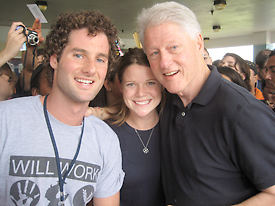As President Bill Clinton spoke about the global problem of malnutrition while delivering the commencement address at U-M in 2007, student Steven Weinberg was so moved by the president’s words that he decided to take action.
Weinberg founded Will Work For Food (WWFF), which attempts to bridge the gap between local community service and international relief work. While attending a Clinton Global Initiative for Universities (CGIU) conference in April at Miami University, Weinberg met Clinton and got a chance to tell him about the program.

During a Clinton Global Initiative for Universities conference at Miami University, Steven Weinberg, left, founder of Will Work For Food, meets with CGIU representative Sarah Avery and President Bill Clinton. Photo courtesy Steven Weinberg.
“He gave me his personal card and said he wanted to hear more about it,” says Weinberg, a pre-med senior also studying economics. “We spoke for about three or four minutes. … It was the quintessential elevator pitch.”
CGIU encourages students to commit to making a tangible change in the world. Weinberg and a team from WWFF saw the conference as an opportunity to focus their goal of making their program a national initiative.
WWFF currently has about 30 members at U-M, and chapters at 25 high schools and colleges nationwide.
Additional U-M students who attended the conference with Weinberg include Natalie Fratto, a sophomore and director of marketing for WWFF; Robbie Dembo, a junior and director of community outreach for WWFF; and Matt Woelfel, a sophomore and director of operations for WWFF.
WWFF encourages participants to partake in some kind of community service, and to ask someone to sponsor their work with a donation to the program. All funds raised help affiliate organization Doctors Without Borders to purchase and distribute nutritional supplements to severely malnourished children. So far it has raised more than $30,000, but Weinberg expects that figure to increase to $50,000 by the end of May.
Next year WWFF will be housed for the first time in an office at the Michigan Union. This comes as a great relief to Weinberg, who took a low course load this semester while working 40-50 hours a week out of his apartment or the trunk of his car.
“Being placed in the Union is a central location and we will be able to engage all types of students,” he says.
This summer, Weinberg will be conducting training in dorms for students from across the country interested in starting the service program on their respective campuses.
University leaders have been so impressed with the program that last year the Office of the Provost and Office of the President each gave WWFF $5,000 grants. The funds were used to launch a national campaign.
“They saw real potential in it and it was a real boost for us,” Weinberg says. “We are blown away by the support we have received from the university. We are really fortunate to have U-M behind us.”
For more information, go to www.willworkforfood.org.

